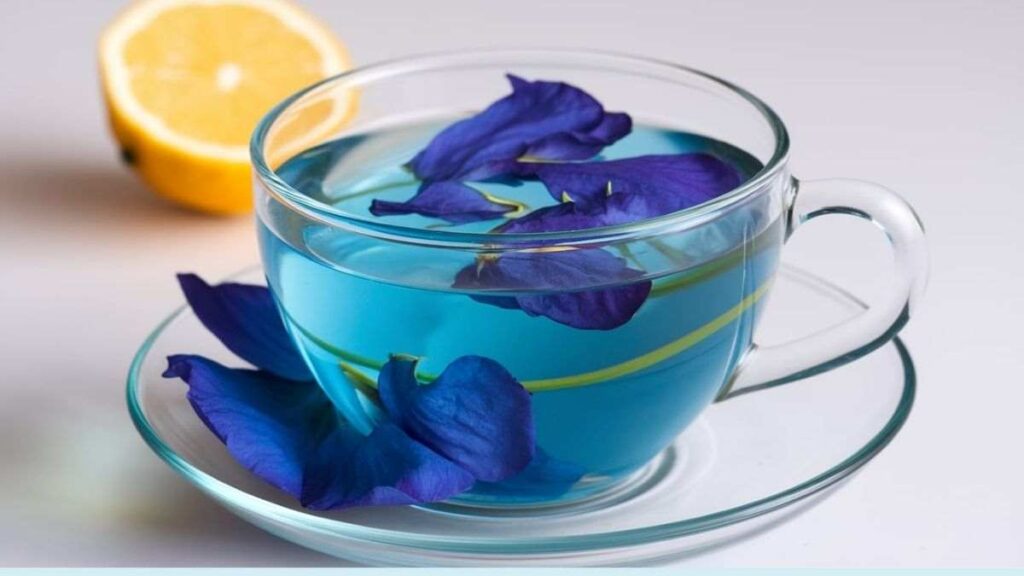What is Blue Tea?
Blue tea, also known as butterfly pea tea, is a soothing herbal drink made by steeping dried petals from the Clitoria ternatea plant. This flowering plant, native to South Asia, is recognized for its vibrant blue hue and medicinal properties. Often flavored with spices such as mint, ginger, cinnamon, or lemongrass, it offers both a refreshing taste and health benefits.
The butterfly pea flowers vary in color from white to deep blue, thanks to the presence of anthocyanins, which are antioxidant compounds also found in other blue and purple fruits and vegetables. Interestingly, the tea can shift colors to red, violet, or green when brewed depending on the acidity. Adding lemon, lime, or tonic water can enhance this color-changing effect.
Health Benefits of Blue Tea
Here are some of the well-known benefits of drinking blue tea, supported by research:

1. Loaded with Antioxidants
Blue tea is a powerhouse of antioxidants, particularly anthocyanins, which are responsible for its signature color. These antioxidants fight harmful free radicals, reducing oxidative stress in the body and lowering the risk of diseases like heart disease, diabetes, and certain cancers.
A key anthocyanin in butterfly pea flowers, delphinidin, has been shown to protect cells from lipid peroxidation — a process that damages cell membranes, accelerates aging and promotes the formation of cancer-causing compounds.
Additionally, a small study found that people who consumed butterfly pea flower extract after a high-fat meal had increased levels of Glutathione peroxidase (Gpx), an antioxidant enzyme that helps reduce cell damage caused by fat oxidation.
2. Supports Heart Health
Regular consumption of blue tea can support cardiovascular health by lowering blood pressure and improving cholesterol levels. Animal studies indicate that butterfly pea extract helps relax blood vessels, which improves circulation. It also has antithrombotic properties, meaning it may help prevent blood clots, which are a major cause of stroke.
A study on 16 men who were overweight or obese found that butterfly pea extract reduced the formation of fat cells and lowered triglyceride accumulation after a high-fat meal — two factors that can contribute to heart disease. Researchers believe these benefits stem from the plant’s ability to block pancreatic lipase, an enzyme that breaks down dietary fats.
3. Other Notable Benefits
- Antifungal and Antimicrobial Properties: Some compounds in blue tea may offer protection against fungal infections, particularly from Penicillium expansum, and antibacterial effects against Streptococcus mutans and Staphylococcus aureus.
- Brain Health: While animal studies suggest that butterfly pea extract may enhance memory and help prevent memory loss in Alzheimer’s disease, more human research is needed to confirm these findings.
- Caffeine-Free Alternative: Since it’s not derived from the traditional tea plant (Camellia sinensis), blue tea is naturally caffeine-free, making it a great choice for those looking to cut down on their caffeine intake.
- Natural Food Coloring: Its brilliant blue hue makes it a popular natural alternative to synthetic food dyes, which have raised health concerns in recent years.
Can You Drink Blue Tea Daily?
Yes, you can enjoy blue tea every day! Known for its calming and mood-enhancing effects, blue tea may help reduce stress and anxiety. It has no specific time for consumption, so you can sip it whenever you like — morning, afternoon, or evening.
Does Blue Tea Help with Weight Loss?
Yes, blue tea is often linked to weight loss because it is rich in antioxidants and anti-inflammatory compounds that support the body’s natural detoxification processes. This helps in reducing unwanted fat, including belly fat.
Blue Tea and Digestion
The tea’s antioxidant properties also aid digestion and help maintain a healthy gut environment. Its gentle diuretic effect can assist with flushing out toxins from the body, promoting overall wellness.
How To Enjoy Blue Tea: Hot or Cold?
One of the best things about blue tea is its versatility. Whether you prefer a warm cup of tea or a chilled, refreshing drink, blue tea delivers. Its subtle earthy flavor with a mild sweetness makes it enjoyable in either form, so feel free to brew it to your liking, whether hot or cold.
Summary of Benefits:
- Boosts Antioxidant Levels: Helps fight free radicals and oxidative stress.
- Promotes Heart Health: Supports better blood flow and cholesterol management.
- Supports Weight Loss: Aids in detoxification and fat reduction.
- Improves Digestion: Enhances digestive health and helps with toxin elimination.
- Good for Skin and Hair: Nourishes skin and stimulates hair growth.
- Brain Health: Potential memory-boosting properties.
- Natural Food Colorant: An alternative to artificial food dyes.
In short, blue tea offers numerous health benefits, from supporting heart health to aiding digestion, and it’s a caffeine-free option that can be enjoyed daily.
